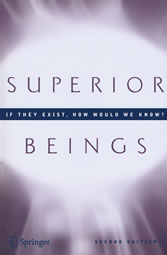Suchen und Finden

Superior Beings. If They Exist, How Would We Know? - Game-Theoretic Implications of Omnipotence, Omniscience, Immortality, and Incomprehensibility
Mehr zum Inhalt

Superior Beings. If They Exist, How Would We Know? - Game-Theoretic Implications of Omnipotence, Omniscience, Immortality, and Incomprehensibility
This book examines theology and the idea of a superior being in the context of game theory. The central question posed in this book is: If there existed a superior being who possessed the supernatural qualities of omniscience, omnipotence, immortality, and incomprehensibility, how would he/she act differently from us?
The mathematical theory of games is used to define each of these qualities, and different assumptions about the rules of play in several theological games that might be played between ordinary human beings and superior beings like God are posited.
Alle Preise verstehen sich inklusive der gesetzlichen MwSt.

















